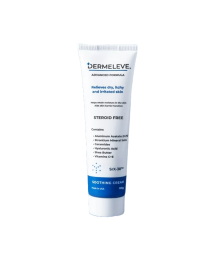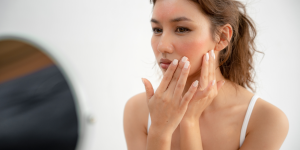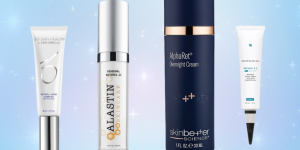Free Shipping Over $100
Free Samples With Every Purchase
Auto Replenishment Available
Authorized Reseller
Best Topical Treatments to Relieve Itchy Skin

Pruritus is the common name for itchy skin, which is an extremely common condition that occurs for a wide range of reasons. Whatever the cause, itchy skin can be painful and irritating if not treated promptly. In this blog, we’ll review some of our dermatologists’ most recommended skincare products and recommended itchy skin treatment.
Understanding the Common Causes of Itchy Skin
All treatment options for dry skin will be reliant on what causes the itchy skin to begin with. Everyone’s response to environmental stimuli is different, so what causes pruritus in one person may not affect another at all. To determine your itchy skin triggers, try to take note of any new products, foods, or other environmental irritants that may be contributing to itchy skin. some of the common reasons people experience skin itching include:
- • Dry Skin – some people have genetically drier skin. Others develop dry skin as they age.
- • Atopic dermatitis (eczema) – eczema is a chronic skin condition that can lead to itchy skin and a variety of other symptoms.
- • Contact dermatitis – this skin condition is very similar to eczema, but it’s caused by skin exposure to irritating substances like chemicals.
- • Allergic reaction – this can be triggered by poison ivy, oak, or sumac as well as other skincare products, cleansers, or other irritants.
- • Bug bites – being bitten by insects, spiders, and other bugs, can lead to hives and itchy skin.
- • Sunburn – when the sun damages the skin, it leads to skin dryness, flaking, and peeling.
- • Dry weather – in the drier winter months or in dry climates, skin is more likely to be itchy and irritated.
- • Disordered emotions – stress, anxiety, obsessive-compulsive disorder, and other emotional disorders, or mental health conditions can lead to a variety of whole-body symptoms, including itchy skin.
- • Whole-body health conditions - Anemia, thyroid disease, liver disease, and other whole-body health conditions have side effects like itchy skin.
Key Ingredients to Look for in Topical Treatments
When you’re building a skincare routine to soothe dry skin, there are numerous skincare ingredients you should check for, including:
- • Hydrocortisone – topical corticosteroids help to alleviate inflammation and soothe skin itch. Hydrocortisone creams are beneficial in alleviating dryness resulting from almost all underlying causes.
- • Calamine – this ingredient offers immediate relief for itchy, inflamed skin related to allergic responses, bug bites, and other environmental irritants. It can be especially beneficial for weeping hives and sores as calamine dries out these oozing lesions. Calamine is not a good option for dry skin.
- • Menthol & camphor – there are numerous over the counter products available that helps to relieve itchy skin by creating different sensations. The topical menthol and camphor cause skin to become cool and then warm before leading to a tingling sensation. This interferes with the skin’s itching sensation.
- • Colloidal oatmeal – this type of oatmeal is just like the oatmeal you eat, but it’s been ground into a fine powder that dissolves in water. You can purchase colloidal oatmeal or make your own by grinding oatmeal and adding the powder to water to create a paste that can be applied to itchy patches of skin. You can also add colloidal oatmeal to a bath to alleviate itch and moisturize skin.
- • Aloe vera – most people think about sunburns when they hear aloe vera, and it is the go-to treatment to heal skin following sunburns and other types of burns. Aloe vera is healing and moisturizing, and it soothes itchy skin.
Effective Over-the-Counter Products
There are a wide range of skincare products available over the counter to alleviate skin dryness, itching, and irritation. The best way to heal itchy skin is to create an effective skincare routine with products that hydrate and soothe skin. A good routine to follow for itchy skin is outlined below:
- • Cleanse - ALASTIN Skincare Gentle Cleanser – even cleaning skin can cause increased irritation when dryness occurs. This is a gentle, non-drying cleanser that soothes and moisturizes skin.

- • Hydrating serums - SkinCeuticals HA Intensifier – hyaluronic acid is a naturally occurring substance that not only moisturizes skin immediately, it also continues to attract moisture to skin for hours after. Those with dry skin often don’t have adequate natural levels of hyaluronic acid, but serums like the SkinCeuticals HA Intensifier boost natural hyaluronic acid levels.

- • Treat itchy skin on the body – Dermeleve Itch Cream – a non-steroidal formula that gently soothes and heals dry skin, itch, and irritation.
- • Treat itchy skin on the scalp – Dermeleve Anti-Itch Scalp Serum – this product soothes itch, irritation, and flaky dryness on the scalp.

- • Facial Moisturizer - Revision Skincare D.E.J. Face Cream and Revision Skincare D.E.J. Night Face Cream – these products are designed to improve the natural skin barrier. That ensures skin stays hydrated all-day long.

- • Sunscreen - EltaMD UV Restore Broad-Spectrum SPF 40 – for dry itchy skin, it’s essential to prevent sun damage and moisture loss that occur when skin is exposed to UVA and UVB rays. However, sunscreens may also be irritating to dry skin. For this reason, it’s important to choose a sunscreen like the EltaMD UV Restore Broad-Spectrum SPF 40 that offers increased skin hydration.

Home Remedies and Natural Treatments
In addition to these recommended products for soothing itchy skin, many people find itchy skin relief using at-home remedies. Coconut oil, baking soda, aloe vera, and apple cider vinegar are often go-to natural treatments to alleviate pruritus. While your dermatologist won’t necessarily recommend these products for addressing itch skin, they are typically harmless to skin when used sparingly. If you notice any signs of irritation, discontinue use and consult with a dermatologist to receive appropriate treatment.
Preventing Itchy Skin
Preventing itchy skin starts by understanding the causes of itchy skin, so the first step to preventing pruritus is to identify your itchy skin triggers. A dermatologist can help you identify the underlying causes of skin itching, and there are a number of steps you can take to prevent itchy skin, including:
- • Avoiding common irritants.
- • Moisturizing skin at least twice a day.
- • Using gentle skincare products with minimal ingredients.
- • Wearing soft, lightweight clothing.
- • Taking cool or lukewarm baths with colloidal oatmeal.
- • Applying sunscreen daily to avoid drying sun damage.
- • Applying additional moisturizer or using a humidifier, during the dry winter months.
- • Using bug repellents to prevent bug bites.
- • Wearing clothing to cover skin when exposure to irritants like poison ivy, oak, or sumac is possible.
When to Consult a Dermatologist
Itchy skin is rarely a sign of any serious skin or whole-body health concerns. While this is good news, it doesn’t mean you should never talk to your dermatologist about itchy, irritated skin. A dermatologist can help you manage skin itch and offer advanced dermatologic treatment options that address underlying causes of pruritis and prevent itching before it begins. Some treatment options your dermatologist may recommend for itchy skin include:
- • Prescription steroids – prescription-strength topical and/or oral steroids alleviate itch and inflammation. Prescription steroids are usually a short-term solution. Long-term, taking over-the-counter antihistamines or anti-inflammatory medications is usually a better option to alleviate allergy-related skin itching.
- • Antidepressants – while it may seem unlikely, certain types of antidepressants have been shown to alleviate chronic skin itching, especially for those who do not know for sure what has caused their skin itching.
- • Biologics – for chronic skin conditions like psoriasis, eczema, and contact dermatitis, biologics may be prescribed. These medications are designed to manage overactive immune system responses that trigger flareups in numerous chronic skin conditions that often result in itchy skin.
- • Phototherapy – using intense light pulses, skin redness, inflammation, and itching are alleviated. This treatment option is only recommended for those who are experiencing intense, prolonged, treatment-resistant pruritis.
Address Itchy Skin Right Away
If you’re dealing with chronic itchy skin or you’ve experienced skin itching that isn’t improved by your current skincare routine, it’s important to adjust your daily regimen to address itchy, dry skin. A dermatologist can help you develop a daily skincare routine or find the best available treatments to reduce the symptoms of pruritis and keep skin healthy.
Explore Our High-Quality Skincare Products
If you want to explore more skincare products formulated for itchy, sensitive skin or to address a diverse array of skin health concerns and skincare goals, we hope you’ll take some time to explore all that DermSkincare has to offer. The products available on our site have all been hand-selected by professional dermatologists. You can also come back regularly to read our blog and receive more tips on how to keep your skin looking radiant and feeling great.















